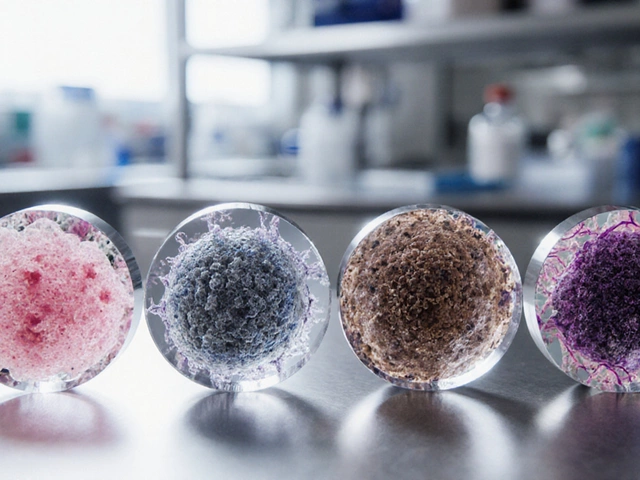
The Most Aggressive Cancer and What You Need to Know
Talking about cancer isn't easy, but it's essential, especially when diving into the topic of which type is most aggressive. If you've ever wondered why pancreatic cancer is often in the spotlight, it’s because it’s notoriously fast-spreading and tricky to catch early. This cancer typically doesn't show symptoms until it's quite advanced, making treatment difficult and urgent.
Pancreatic cancer ranks high on the aggressiveness scale due in part to its ability to quickly spread to other organs. It's one sneaky foe, with vague symptoms that could easily be mistaken for other less severe ailments. Abdominal pain or unexplained weight loss could be signs, but let's be real, these symptoms sound familiar to many other everyday issues.
But here's the good news—awareness is a powerful tool. By staying informed, recognizing symptoms early, and understanding the available treatments, we stand a better chance at managing this condition. Plus, there's a lot happening in the world of cancer research that's shining a light on better detection methods and more effective treatments. So let's dive into what makes pancreatic cancer so aggressive and what steps are being taken to fight it.
- Understanding Aggressive Cancers
- Spotlight on Pancreatic Cancer
- Symptoms and Early Detection
- Current Treatment Options
- Research and Future Outlook
Understanding Aggressive Cancers
Diving into the world of aggressive cancer can feel overwhelming, but knowing what you're up against gives you a fighting chance. So, what makes a cancer aggressive, anyway? It's all about the pace at which it grows and spreads. These types tend to have a high mitotic rate, meaning the cells divide and multiply quickly—much faster than normal. Cancers like pancreatic and small cell lung cancer are often mentioned because they exemplify these traits.
The Scary Traits
Aggressive cancers are often characterized by their ability to invade nearby tissues and organs swiftly and unabated. This behavior makes early detection critical, yet challenging, as they don't play by the textbook, often staying hidden until they're well established.
A well-known oncologist, Dr. James Lee, once said,
"An aggressive cancer doesn't just hide—it adapts and finds ways to thrive, even under the toughest conditions."
This adaptability is a big reason why treatment options, although advancing, can often seem like a game of catch-up.
Common Types
Besides pancreatic cancer, other cancers notorious for their aggressive nature include small cell lung cancer, certain forms of breast cancer, and liver cancer. What these have in common is the stealthy way they operate, often with symptoms that are easily overlooked or attributed to non-cancerous causes.
How Aggressive Is It?
Researchers use various criteria to gauge a cancer's aggressiveness. This can include factors like the cancer's grade, stage at diagnosis, and genetic markers. Here's where a little science helps; knowing your enemy gives doctors clues on how best to fight it.
| Cancer Type | Typical Grade | Usual Stage at Diagnosis |
|---|---|---|
| Pancreatic | 3-4 | Stage III-IV |
| Small Cell Lung | 3-4 | Stage III |
Understanding these traits not just helps in treatment planning but also in creating better support systems for patients as they navigate their journey.
Spotlight on Pancreatic Cancer
When we talk about pancreatic cancer, we're looking at a tough opponent. This type of cancer shows up in the pancreas, an organ nestled behind your stomach, which plays a crucial role in digestion and blood sugar regulation. But why is it known as one of the most aggressive cancers?
Why is it Aggressive?
The key challenges are late diagnosis and rapid progression. Pancreatic cancer often lacks symptoms in the early stages, cruising under the radar until the situation gets serious. By the time it gets noticed, it might have spread, complicating treatment options.
Statistics: A Quick Look
| Statistic | Details |
|---|---|
| Survival Rate | Only about 10% five-year survival rate |
| Diagnosis Age | Around 70% diagnosed after age 65 |
These numbers might sound daunting, but they highlight the importance of awareness and early action.
Influencing Factors
Several factors can ramp up the risk of developing this cancer. Smoking is a biggie, as it doubles the risk. Obesity and family history also play significant roles. And don't forget longstanding diabetes and chronic pancreatitis.
Current Challenges
Treating pancreatic cancer ain't straightforward. Surgery is an option but not always viable due to the cancer's advanced stage at diagnosis. Chemotherapy and radiation are common, but often survival rates remain low compared to other cancers.
Hope on the Horizon
Despite these challenges, every day researchers are pushing the envelope with innovative treatments and tests. Early-detection screenings are a major focus, with the hope that one day, spotting pancreatic cancer early will lead to better outcomes.

Symptoms and Early Detection
When it comes to spotting aggressive cancers like pancreatic cancer, being informed is your first line of defense. Unfortunately, the symptoms can be pretty vague and can mimic other health issues, making early detection tough. But don’t lose hope just yet. Let’s break down what to look out for.
Common signs include persistent abdominal pain, which might radiate to your back, unintended weight loss, and changes in stool color or consistency. You might also experience a loss of appetite or feel fatigued without doing much. Recognizing these red flags can make all the difference for an early diagnosis.
Why Early Detection Is Tricky
Pancreatic cancer often flies under the radar in its early stages mainly because the pancreas is deep inside the abdomen. Symptoms typically pop up once the cancer has spread, by which time treatment becomes more complex. Still, catching it sooner rather than later can lead to much better outcomes.
Tools for Early Detection
Some methods are being developed to improve early detection. Doctors often rely on imaging tests like CT scans or MRIs, and sometimes blood tests to look for specific markers. However, these aren’t foolproof for catching pancreatic cancer early, which is why researchers are working hard on more accurate screening techniques.
Here’s an encouraging nugget: Innovation is constant in the medical field. New tests on the horizon aim to spot markers in your blood or urine that could indicate the presence of pancreatic cancer much earlier than current methods allow.
| Symptom | Prevalence in Patients (%) |
|---|---|
| Abdominal Pain | 70 |
| Weight Loss | 60 |
| Fatigue | 50 |
| Appetite Loss | 40 |
Staying proactive by keeping up with regular health checkups and discussing any nagging symptoms with your doctor can open doors to early intervention, potentially changing the course of this aggressive cancer.
Current Treatment Options
Dealing with aggressive cancer like pancreatic cancer is tough, but there are several treatment paths. The first step is often surgery. If the cancer hasn’t spread beyond the pancreas, doctors might opt to remove parts of it or, in some cases, the entire organ. This isn’t always possible, depending on how advanced the cancer is.
Chemotherapy
When it comes to tackling aggressive cancers, chemotherapy is a common go-to. It uses powerful drugs to target and kill cancer cells. For pancreatic cancer, it's usually part of a broader treatment plan. While it can shrink tumors, it comes with side effects like nausea and hair loss. But, hey, in a battle like this, every weapon counts.
Radiation Therapy
Radiation therapy is another common method. This involves high-energy rays to knock out cancer cells. It’s often used alongside surgery, either before to reduce tumor size or after to kill any remaining cells. Though it's effective, it can also zap some healthy cells, so balancing treatment and side effects is crucial.
Targeted Therapy
Targeted therapy is a bit of a buzzword in the cancer world these days. It's different from chemo because it zeroes in on specific cancer cells with less impact on normal cells. This precision makes it an exciting option for cancer treatment. Advances in identifying particular genes in pancreatic cancer make this a promising field.
Immunotherapy
What about using the body’s own defense system to fight cancer? That’s where immunotherapy comes in. While it’s still under research for pancreatic cancer, results show it can boost the body’s ability to combat the disease. It's fascinating stuff, as it helps the immune system recognize and attack cancer cells effectively.
Combination Therapies
Lastly, it’s not unusual for doctors to mix jigsaws, combining several treatments. This might be a cocktail of surgery, chemo, and radiation to better tackle this beast. Treatment plans are highly individual because what works for one person might not for another, so it’s important to personalize the approach.
Regardless of the treatment path, staying informed about these options allows patients to actively participate in their care. With medical advancements and evolving strategies, there’s more reason than ever to stay hopeful and vigilant in the fight against aggressive cancer.

Research and Future Outlook
The fight against aggressive cancer like pancreatic cancer is ongoing, and researchers are pulling out all the stops to change the landscape. From new drugs to innovative therapy methods, significant strides are being made. Let's take a look at some of the promising research that's paving the way forward.
Targeted Therapy Advances
One of the most exciting developments is in targeted therapy. This approach involves designing medications that specifically attack cancer cells without harming normal cells. While traditional chemotherapy blasts all fast-growing cells, targeted therapy is more like a precision missile. Scientists are identifying unique markers in pancreatic cancer cells, allowing for drugs that can hone in on these markers and hopefully improve survival rates.
Early Detection Techniques
Detecting pancreatic cancer early can be game-changing. Researchers are investing in blood tests that look for biological markers—proteins or DNA fragments shed by cancer cells. Imagine how much earlier we could start treatment with such an early warning system!
Immunotherapy Breakthroughs
Immunotherapy has been a buzzword in cancer treatment recently. It's a method that encourages your immune system to recognize and attack cancer cells. In some trials, patients with aggressive cancer have seen promising results, although more research is needed to fine-tune how it can work for different people.
Looking Ahead
The horizon looks promising but complex. A mix of better detection methods, smarter drugs, and personalized approaches seems to be the key. Everyone's path to defeating cancer will likely be unique, but these advances give hope. Clinicians and researchers continue to break new ground and push the envelope, so stay tuned for what the future holds.
To put it in perspective, here’s a quick table highlighting some of the recent improvements and ongoing challenges in dealing with pancreatic cancer:
| Research Area | Recent Improvements | Challenges |
|---|---|---|
| Targeted Therapy | Specific drug trials showing progress | Limited to certain genetic markers |
| Early Detection | Promising blood test developments | Making tests widely available |
| Immunotherapy | Encouraging trial results | Understanding individual immune responses |
Every day, scientists work tirelessly in labs worldwide. While challenges remain, the future of cancer treatment promises to be bright with ongoing innovation and discoveries.

Arnav Singh
I am a health expert with a focus on medicine-related topics in India. My work involves researching and writing articles that aim to inform and educate readers about health and wellness practices. I enjoy exploring the intersections of traditional and modern medicine and how they impact healthcare in the Indian context. Writing for various health magazines and platforms allows me to share my insights with a wider audience.
About
Medical Resource Center India is a comprehensive online platform dedicated to providing reliable health information and medical resources in India. Explore a wide range of articles, tips, and advice on medicine, healthcare services, and wellness. Stay informed about the latest developments in Indian medicine and access valuable insights into maintaining a healthy lifestyle. Discover expert guidance and health solutions tailored for every Indian citizen. Your go-to destination for authoritative medical knowledge in India.








